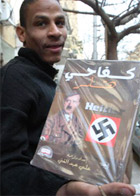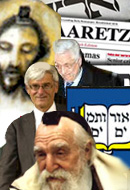Sabbath & Holidays
 In God They Trust?
In God They Trust?Thursday, February 9, 2012 by Elliot Jager | Jewish Ideas Daily » Daily Features
Stick an average alumnus of the Israeli public school system into a synagogue during morning prayers, and chances are they would be bewildered. Even if they could recollect an arid Bible class they had to endure long ago, what good would it do them? They'd still be lost.
Wednesday, February 8, 2012 by Michael Carasik | Jewish Ideas Daily » Weekly Portions
This week's portion describes the giving of the Ten Commandments, and the Torah spares no expense to bring us special effects worthy of the event: smoke and fire, thunder and lightning, and an earthquake, all accompanied by the blare of a shofar growing louder and louder. The Israelites are about to experience God's self-revelation, in a most dramatic fashion. But this week also has something for those who like their dramatic moments more subtle.
 From New Year to Arbor Day
From New Year to Arbor DayWednesday, February 8, 2012 by Moshe Sokolow | Jewish Ideas Daily » Daily Features
The holiday of Tu Bishvat ("the fifteenth of Shvat") falls this year on Wednesday, February 8. What are its origins, and when and why did it become incorporated into the calendar as the Jewish "Arbor Day"?
Wednesday, February 1, 2012 by David Hazony | Jewish Ideas Daily » Weekly Portions
The stories in this week's reading may seem disjointed, but in fact they form a single unit. A modern editor, looking for a groovy chapter title, might have called the collection, "Ancient Israel's Bipolar Moment." Or, even more flippantly, "Hands Up!"
 Whose Holocaust?
Whose Holocaust?Friday, January 27, 2012 by Margot Lurie | Jewish Ideas Daily » Daily Features
For much of Europe, today is the UN-designated International Holocaust Remembrance Day. Secretary-General Ban Ki-moon has dedicated his address this year to children murdered by the Nazis, with the message that "the best tribute to the memory of these children is an ongoing effort to teach the universal lessons of the Holocaust, so that no such horror is visited upon future generations."
Wednesday, January 25, 2012 by Moshe Sokolow | Jewish Ideas Daily » Weekly Portions
Our parashah begins: "God said to Moses: 'Come to Pharaoh, for I have hardened his heart and the heart of his servants in order to place these signs of mine in his midst.'" Indeed, this motif of the hardened heart already appeared in last week's portion and recurs nearly a dozen times in the context of the ten plagues. The problem, however, is this: If Pharaoh and the Egyptians were denied free will in their dealings with Moses, how can their subsequent punishment be justified?Va’era: What’s in a Name? (Part Two)
Wednesday, January 18, 2012 by Michael Carasik | Jewish Ideas Daily » Weekly Portions
In last week's column, Moshe Sokolow pointed out that the name of the portion was Sh'mot, a word that itself means "names." He took that as an opportunity to mention some of the more interesting Jewish surnames and their meanings. I cannot resist adding my own favorite: Remba, an acronym taken from Proverbs 19:21, "Many are the schemes of the human mind."Sh’mot: What’s in a Name?
Wednesday, January 11, 2012 by Moshe Sokolow | Jewish Ideas Daily » Weekly Portions
"These are the names of the children of Israel": Despite having designated them by name during their lifetimes, [Scripture] enumerates them again, posthumously, to indicate how beloved they were. (Rashi 1:1) While the traditional English title of Sh'mot is "Exodus," the word translates literally as "names." This presents us with the opportunity to explore the significance the Bible attaches to names, in general, and the meaning of one individual name, in particular.Vay’hi: Zealotry and Tolerance
Wednesday, January 4, 2012 by David Hazony | Jewish Ideas Daily » Weekly Portions
The time of patriarchs was reaching its end. Jacob was dying, and alongside his dictation of burial arrangements, he also gave final words to his twelve sons, words in which he would tell them "what will befall you in the end of days." We usually read them as his final "blessings." But in the case of two sons, Simeon and Levi, they are assuredly curses.
 Highlights of 2011:
Highlights of 2011:Part II
Friday, December 30, 2011 | Jewish Ideas Daily » Daily Features
Part II of our round-up of the past year's most popular features on Jewish Ideas Daily. (Part I is here.)
Editors' Picks
Me and Jonah Harold Bloom, New York Review of Books.
My favorite book of the Bible is a sly masterpiece, a parody of prophetic solemnities, a magnificent piece of literature because it is so funny.
The Limits of Tikkun Olam Joel Alperson, JTA. To my fellow non-Orthodox Jews: as a community, we must repair ourselves far more urgently than we must repair the world.
The Three-Week Challenge Erica Brown, Text & Texture. The mourning rituals of the period leading up to Tisha b'Av (this year on August 9) are largely foreign territory to non-Orthodox Jews; but doesn't everyone know the meaning of loss?
Struggling to Survive Howard Shapiro, Forward. From Butte (Montana) to Paducah (Kentucky) to Sumter (North Carolina), Jewish life is on the wane while communities elsewhere in the same states thrive.
The Poet's Poet's Poet Jake Marmer, Forward. For Louis Zukofsky, a leading force behind the Objectivist movement, Judaism was a compass to navigate worlds old and new.
Sabbath Rock BibleWalks. Newly discovered: carved into a rock in Lower Galilee is the word shabbat, likely a Roman-era marking of the furthest point to which local Jews could travel on the day of rest.
The Hebrew Hammer Eitan Kensky, Jewish Review of Books. The closest a Jewish hitter has come to perfection: Hank Greenberg's 58 home runs for the Detroit Tigers in 1938.
Irving Kristol and the Rabbis Meir Soloveichik, Jewish Review of Books. Was the neoconservative intellectual also a "neo-Orthodox" Jew?
Ties that Bind Philologos, Forward. The Wimpel, a Torah sash unique to German Jewry, was sewn from the cloth used to swaddle a baby boy after circumcision.
Whose Woods These Are Ralph Gardner, Jr., Wall Street Journal. On the trail with the "adventure rabbi," seeking the divine in the great outdoors.

